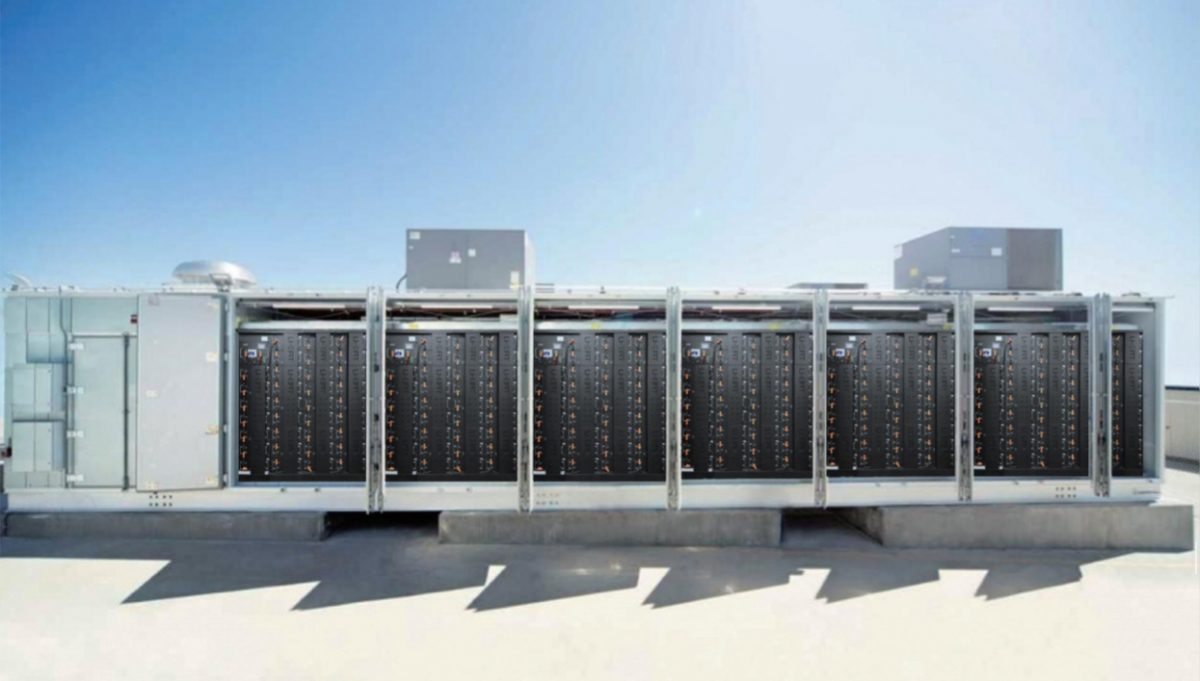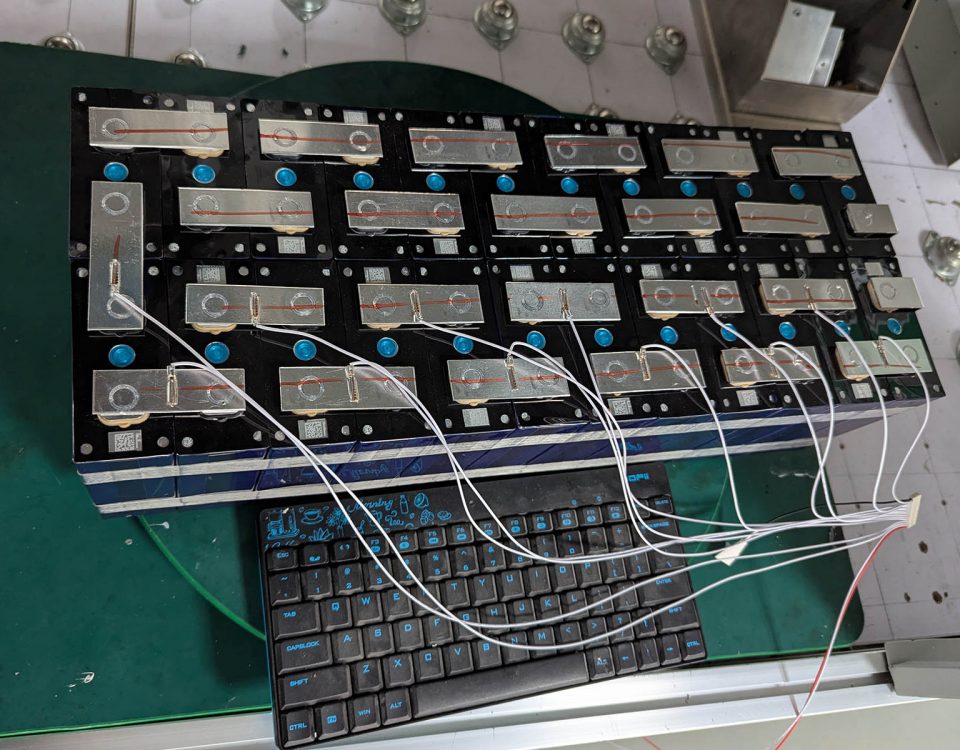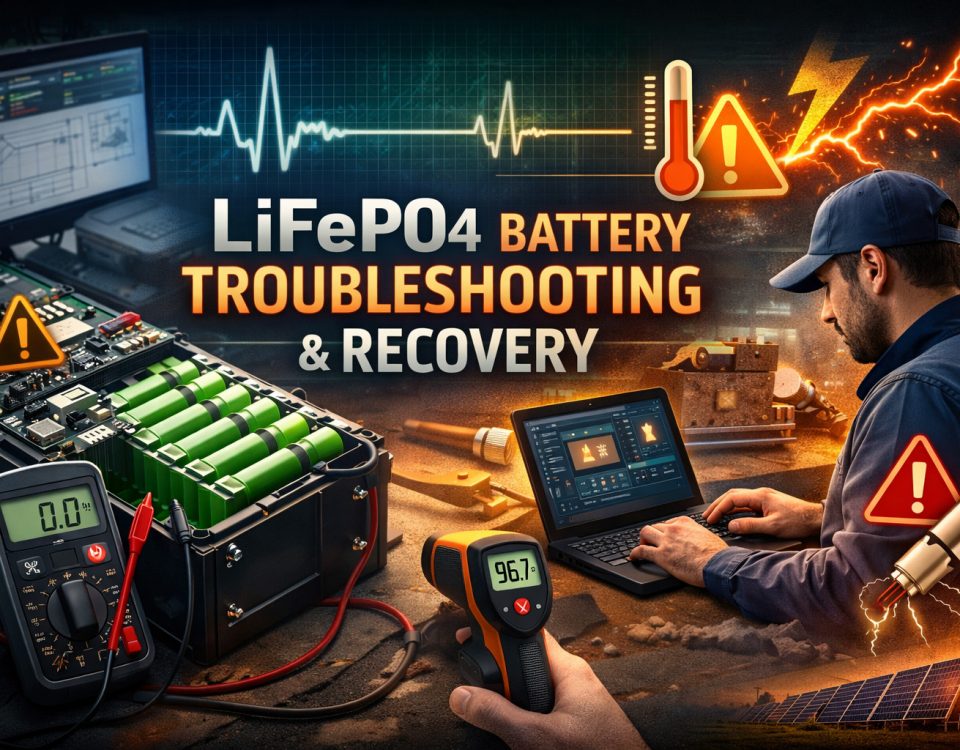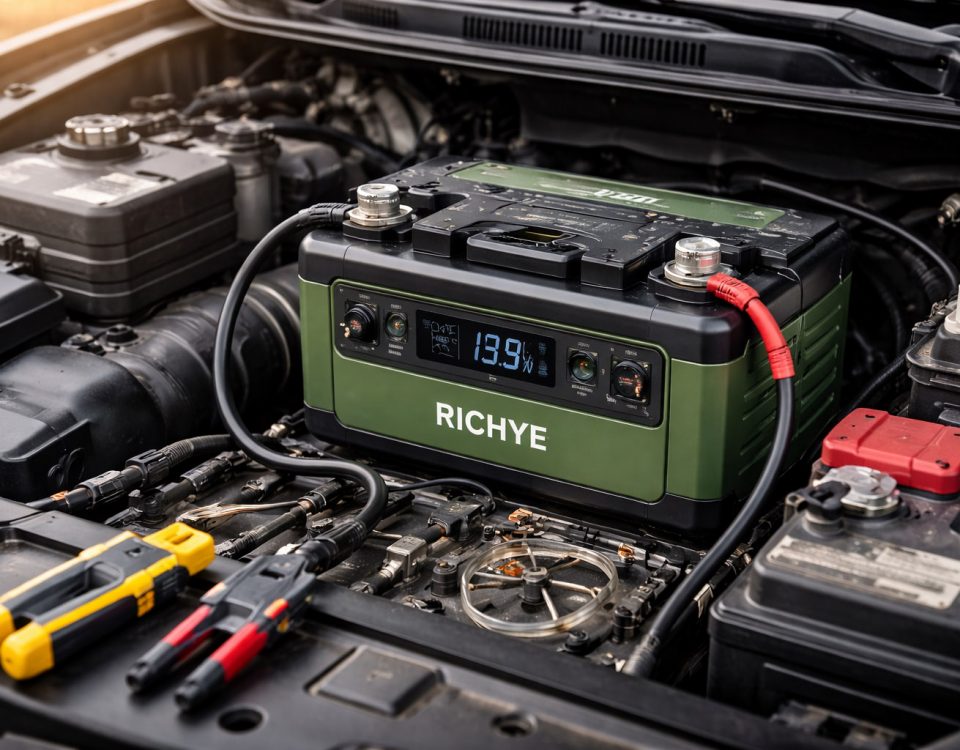ในขณะที่โลกกำลังเปลี่ยนไปสู่โซลูชันพลังงานที่ยั่งยืนและมีประสิทธิภาพมากขึ้น การเก็บกักพลังงาน ได้กลายเป็นรากฐานสำคัญของโครงสร้างพื้นฐานด้านพลังงานสมัยใหม่ แบตเตอรี่ลิเธียมไอออนได้ก้าวขึ้นมาเป็นเทคโนโลยีชั้นนำในการปฏิวัติครั้งนี้ โดยมอบความสามารถและประสิทธิภาพขั้นสูงที่เปลี่ยนแปลงอุตสาหกรรมต่างๆ ตั้งแต่พลังงานหมุนเวียนไปจนถึงยานยนต์ไฟฟ้า อย่างไรก็ตาม ภูมิทัศน์ของการกักเก็บพลังงานไม่ได้จำกัดเพียงแค่การชาร์จโทรศัพท์หรือรถยนต์ไฟฟ้าเท่านั้น แต่ยังเกี่ยวกับการเพิ่มประสิทธิภาพการใช้พลังงานสำหรับทั้งบ้าน ธุรกิจ และแม้แต่โครงข่ายไฟฟ้าของประเทศอีกด้วย
ในบทความนี้ เราจะสำรวจว่าแบตเตอรี่ลิเธียมกำลังเปลี่ยนแปลงภูมิทัศน์ของการกักเก็บพลังงานอย่างไร สิ่งที่ควรพิจารณาเมื่อลงทุนในแบตเตอรี่เหล่านี้ และเหตุผลที่แบตเตอรี่ลิเธียมกำลังจะกลายเป็นโครงสร้างพื้นฐานของระบบพลังงานที่ยั่งยืน
ความสำคัญที่เพิ่มขึ้นของการกักเก็บพลังงาน
การเก็บกักพลังงานไม่ใช่สาขาเฉพาะทางอีกต่อไป ด้วยการขยายตัวอย่างรวดเร็วของแหล่งพลังงานหมุนเวียน เช่น พลังงานแสงอาทิตย์และพลังงานลม ความต้องการในการเก็บกักพลังงานอย่างมีประสิทธิภาพจึงมีความสำคัญอย่างยิ่ง แหล่งพลังงานเหล่านี้มีความไม่ต่อเนื่อง—พลังงานแสงอาทิตย์ไม่สามารถใช้ได้ในเวลากลางคืน และพลังงานลมมีความแปรปรวนตามสภาพอากาศ เพื่อให้พลังงานหมุนเวียนมีความน่าเชื่อถือ จึงจำเป็นต้องเก็บกักพลังงานไว้ใช้เมื่อความต้องการเกินกว่าการผลิต
โซลูชันการกักเก็บพลังงานแบบดั้งเดิม เช่น ระบบสูบน้ำขึ้นเขากับแบตเตอรี่ตะกั่ว-กรด มีข้อจำกัดที่ขัดขวางการขยายขนาดและประสิทธิภาพ นี่คือจุดที่แบตเตอรี่ลิเธียม-ไอออนโดดเด่น ด้วยคุณสมบัติความหนาแน่นพลังงานสูง อัตราการชาร์จและคายประจุที่รวดเร็ว และอายุการใช้งานที่ยาวนาน แบตเตอรี่ลิเธียมกำลังปฏิวัติวิธีการเก็บและจัดการพลังงานของเรา
อะไรทำให้แบตเตอรี่ลิเธียมเหมาะสำหรับการเก็บพลังงาน?
แบตเตอรี่ลิเธียมไอออนโดดเด่นด้วยข้อได้เปรียบสำคัญหลายประการที่ทำให้เหมาะสำหรับการใช้งานเก็บพลังงานทั้งในที่พักอาศัยและอุตสาหกรรม:
1. ความหนาแน่นของพลังงานสูง
หนึ่งในเหตุผลหลักที่ทำให้แบตเตอรี่ลิเธียมไอออนกลายเป็นตัวเลือกที่ได้รับความนิยมสำหรับการเก็บกักพลังงานคือ ความหนาแน่นพลังงานสูง. ซึ่งหมายความว่าพวกมันสามารถเก็บพลังงานได้มากขึ้นต่อหน่วยน้ำหนักหรือปริมาตรเมื่อเทียบกับแบตเตอรี่ประเภทอื่น ๆ เช่น แบตเตอรี่กรดตะกั่ว. ด้วยเหตุนี้พวกมันจึงมีประสิทธิภาพมากขึ้นและประหยัดพื้นที่ ซึ่งมีความสำคัญเป็นพิเศษในกรณีที่มีการจำกัดพื้นที่ เช่น การเก็บพลังงานแสงอาทิตย์ในบ้านหรือการชาร์จรถยนต์ไฟฟ้า
2. อายุการใช้งานยาวนาน
แบตเตอรี่ลิเธียม ยังโดดเด่นในด้าน วงจรชีวิตซึ่งหมายถึงจำนวนรอบการชาร์จและการคายประจุที่แบตเตอรี่สามารถทำได้ก่อนที่ความจุจะเริ่มเสื่อมลง แบตเตอรี่ลิเธียมไอออนคุณภาพสูงสามารถใช้งานได้นานถึง 2,000 ถึง 5,000 รอบ ขึ้นอยู่กับคุณภาพของแบตเตอรี่ ทำให้เป็นการลงทุนระยะยาวในการเก็บพลังงาน เมื่อเปรียบเทียบกับแบตเตอรี่ตะกั่วกรดแบบดั้งเดิมซึ่งอาจใช้งานได้เพียง 500 ถึง 1,000 รอบเท่านั้น
อายุการใช้งานที่ยาวนานนี้หมายถึงการเปลี่ยนทดแทนที่น้อยลง ลดของเสีย และต้นทุนรวมในการเป็นเจ้าของที่ต่ำลงตลอดหลายปี
3. อัตราการชาร์จและการคายประจุอย่างรวดเร็ว
แบตเตอรี่ลิเธียมไอออนมีประสิทธิภาพอย่างเหลือเชื่อ อัตราการชาร์จและคายประจุอย่างรวดเร็ว, ทำให้สามารถเก็บและดึงพลังงานได้รวดเร็วขึ้น. นี่คือปัจจัยสำคัญสำหรับระบบเก็บพลังงานที่ใช้ในสภาพแวดล้อมที่มีการเปลี่ยนแปลงอย่างรวดเร็ว เช่น ระบบกริดพลังงานหมุนเวียน ที่ความต้องการพลังงานเปลี่ยนแปลงอย่างรวดเร็ว. แบตเตอรีลิเธียมสามารถเก็บพลังงานจากแผงโซลาร์เซลล์ในช่วงเวลาที่มีแสงแดดจัด และปล่อยพลังงานออกมาอย่างรวดเร็วเมื่อมีความต้องการเพิ่มขึ้น.
4. กะทัดรัดและน้ำหนักเบา
เมื่อเปรียบเทียบกับเทคโนโลยีการเก็บกักพลังงานแบบดั้งเดิม แบตเตอรี่ลิเธียม-ไอออน เบากว่าและกะทัดรัดกว่า, ทำให้ติดตั้งและผสานเข้ากับระบบพลังงานหลากหลายประเภทได้ง่ายขึ้น ซึ่งถือเป็นข้อได้เปรียบอย่างยิ่งในการใช้งานระบบกักเก็บพลังงานในที่พักอาศัยที่มีพื้นที่จำกัด ขนาดที่เล็กยังช่วยลดความต้องการโครงสร้างพื้นฐานขนาดใหญ่ ซึ่งช่วยประหยัดค่าใช้จ่ายเพิ่มเติมอีกด้วย
5. ประโยชน์ต่อสิ่งแวดล้อม
แบตเตอรี่ลิเธียมไอออนเป็นมิตรต่อสิ่งแวดล้อมมากกว่าโซลูชันการเก็บพลังงานแบบดั้งเดิม พวกมันมีวัสดุที่เป็นพิษน้อยกว่า และแบตเตอรี่ลิเธียมไอออนหลายชนิดถูกออกแบบมาเพื่อ ความสามารถในการรีไซเคิลนอกจากนี้ เมื่อการนำพลังงานหมุนเวียนมาใช้เพิ่มขึ้นอย่างต่อเนื่อง ความต้องการในโซลูชันการเก็บกักพลังงานที่ยั่งยืนและมีคาร์บอนต่ำก็เพิ่มขึ้นเช่นกัน ซึ่งทำให้แบตเตอรี่ลิเธียมกลายเป็นส่วนสำคัญของปริศนา
ปัจจัยที่ควรพิจารณาเมื่อเลือกแบตเตอรี่ลิเธียมสำหรับการกักเก็บพลังงาน
ในขณะที่แบตเตอรี่ลิเธียมไอออนมีศักยภาพมหาศาลสำหรับการเก็บพลังงาน การเลือกประเภทแบตเตอรี่ที่เหมาะสมกับความต้องการเฉพาะของคุณเป็นสิ่งสำคัญอย่างยิ่ง ด้านล่างนี้คือปัจจัยสำคัญที่ควรพิจารณา:
1. ความจุแบตเตอรี่
ความจุแบตเตอรี่ ซึ่งโดยทั่วไปวัดใน กิโลวัตต์-ชั่วโมง (kWh), แสดงถึงปริมาณพลังงานที่แบตเตอรี่สามารถเก็บไว้ได้. ยิ่งความจุมาก, แบตเตอรี่ก็จะสามารถเก็บพลังงานไว้ใช้ในภายหลังได้มากขึ้น. สำหรับเจ้าของบ้านหรือธุรกิจที่ต้องการใช้ระบบไฟฟ้าแบบไม่พึ่งพาไฟฟ้าจากระบบสายส่ง, หรือผู้ที่ต้องการลดการพึ่งพาไฟฟ้าจากระบบสายส่ง, การเลือกแบตเตอรี่ที่มีความจุเพียงพอจึงมีความสำคัญอย่างยิ่ง.
วิธีเลือก: สำหรับการใช้งานในที่พักอาศัย ความจุ 10 กิโลวัตต์ชั่วโมงถึง 15 กิโลวัตต์ชั่วโมงโดยทั่วไปเพียงพอสำหรับการบริโภคพลังงานเฉลี่ยต่อวัน สถานที่ขนาดใหญ่หรือการใช้งานในภาคอุตสาหกรรมอาจต้องการความจุมากกว่า 100 กิโลวัตต์ชั่วโมง
2. ประสิทธิภาพการเดินทางไปกลับ
ประสิทธิภาพการหมุนเวียนหมายถึงปริมาณพลังงานที่สูญเสียไประหว่างรอบการชาร์จและการคายประจุ แบตเตอรี่ลิเธียมโดยทั่วไปมีประสิทธิภาพการหมุนเวียนอยู่ที่ 85% ถึง 95% ซึ่งหมายความว่าพลังงานส่วนใหญ่ที่เก็บไว้ในแบตเตอรี่สามารถนำกลับมาใช้ใหม่ได้ นี่เป็นค่าที่สูงกว่าเทคโนโลยีการเก็บพลังงานอื่น ๆ เช่น แบตเตอรี่ตะกั่ว-กรด ซึ่งอาจมีประสิทธิภาพการหมุนเวียนต่ำถึง 70%
วิธีเลือก: ประสิทธิภาพที่สูงขึ้นหมายความว่าคุณจะได้รับพลังงานที่สามารถใช้ได้มากขึ้นจากระบบเก็บกักพลังงานของคุณ ซึ่งอาจมีความสำคัญอย่างยิ่งในการเพิ่มประโยชน์สูงสุดจากแหล่งพลังงานหมุนเวียนเช่นพลังงานแสงอาทิตย์
3. ช่วงอุณหภูมิและสภาพแวดล้อม
ในขณะที่แบตเตอรี่ลิเธียมไอออนมีความทนทานมากกว่าทางเลือกอื่น ๆ หลายชนิด แต่ ความไวต่ออุณหภูมิ ต้องนำมาพิจารณา. ความร้อนหรือความเย็นที่รุนแรงสามารถส่งผลกระทบต่อประสิทธิภาพ, อายุการใช้งาน, และประสิทธิภาพ. ดังนั้น, จึงมีความสำคัญที่จะต้องเลือกแบตเตอรีที่สามารถทำงานได้ดีภายใต้สภาพแวดล้อมที่เฉพาะเจาะจงของสถานที่ติดตั้งของคุณ.
วิธีเลือก: ตรวจสอบให้แน่ใจว่าแบตเตอรี่มีค่าความจุที่สามารถใช้งานได้ในช่วงอุณหภูมิของสถานที่ของคุณ. ในสภาพอากาศที่หนาวเย็น แบตเตอรี่ที่มีระบบจัดการความร้อนในตัวจะเป็นสิ่งจำเป็นเพื่อรักษาประสิทธิภาพการทำงานที่ดีที่สุด.
4. ระบบจัดการแบตเตอรี่ (BMS)
เอ ระบบจัดการแบตเตอรี่ (BMS) เป็นระบบแบบบูรณาการที่ตรวจสอบสุขภาพ, การชาร์จ, และอัตราการคายประจุของแบตเตอรี่ ระบบจัดการแบตเตอรี่ (BMS) ที่มีคุณภาพสูงสามารถปกป้องแบตเตอรี่จากการร้อนเกินไป, การชาร์จเกิน, และการคายประจุลึก ซึ่งช่วยยืดอายุการใช้งานและเพิ่มความปลอดภัย แบตเตอรี่ลิเธียมขั้นสูงหลายรุ่นมีระบบ BMS เพื่อประสิทธิภาพที่ดีที่สุด
วิธีเลือก: มองหาแบตเตอรี่ลิเธียมที่มีระบบจัดการแบตเตอรี่ (BMS) ขั้นสูง เพื่อรับประกันการใช้งานที่ปลอดภัยและมีประสิทธิภาพ โดยเฉพาะอย่างยิ่งหากแบตเตอรี่จะถูกนำไปใช้ในสภาพแวดล้อมที่มีความต้องการสูง เช่น ระบบกักเก็บพลังงานเชิงพาณิชย์
บทบาทของ RICHYE ในอุตสาหกรรมการเก็บกักพลังงาน
เมื่อพูดถึงแบตเตอรี่ลิเธียมไอออนประสิทธิภาพสูงสำหรับการกักเก็บพลังงาน ริชชี่ เป็นชื่อที่โดดเด่น ในฐานะผู้ผลิตแบตเตอรี่ลิเธียมมืออาชีพ RICHYE เชี่ยวชาญในการให้บริการโซลูชันแบตเตอรี่ที่ปรับแต่งตามความต้องการสำหรับการใช้งานที่หลากหลาย รวมถึงระบบกักเก็บพลังงาน ยานยนต์ไฟฟ้า และการใช้งานในอุตสาหกรรม
แบตเตอรี่ลิเธียมของ RICHYE เป็นที่รู้จักกันดีในเรื่อง คุณภาพที่ยอดเยี่ยม, ความน่าเชื่อถือ, และประสิทธิภาพ. ด้วยการมุ่งเน้นด้านความปลอดภัย ความคุ้มค่า และความทนทานที่ยาวนาน RICHYE มั่นใจว่าลูกค้าจะได้รับประโยชน์จากเทคโนโลยีการเก็บกักพลังงานที่ดีที่สุด ไม่ว่าคุณจะมองหาแบตเตอรี่สำหรับการใช้งานในที่พักอาศัยหรือโครงการเชิงพาณิชย์ขนาดใหญ่ RICHYE มีโซลูชันที่สามารถปรับแต่งได้เพื่อตอบสนองความต้องการพลังงานเฉพาะของคุณ
แนวโน้มในอนาคตของการจัดเก็บพลังงานลิเธียม
อนาคตของการเก็บกักพลังงานไม่สามารถปฏิเสธได้ว่าเชื่อมโยงกับเทคโนโลยีลิเธียม-ไอออน. เมื่อเราเดินทางไปสู่พลังงานที่ยั่งยืนมากขึ้น แนวโน้มหลายประการกำลังปรากฏขึ้น:
- การผสานรวมกับระบบโครงข่ายไฟฟ้าอัจฉริยะ: แบตเตอรี่ลิเธียมกำลังถูกผสานเข้ากับระบบกริดอัจฉริยะมากขึ้น ซึ่งช่วยในการจัดการการกระจายพลังงาน ลดความต้องการสูงสุด และเก็บกักพลังงานหมุนเวียนส่วนเกิน
- ต้นทุนที่ลดลง: เมื่อเทคโนโลยีมีความก้าวหน้าและกำลังการผลิตเพิ่มขึ้น ต้นทุนของแบตเตอรี่ลิเธียมไอออนก็ลดลงอย่างต่อเนื่อง ทำให้การกักเก็บพลังงานมีราคาที่เข้าถึงได้มากขึ้นสำหรับทั้งผู้บริโภคและภาคธุรกิจ
- เคมีใหม่ที่กำลังเกิดขึ้น: นวัตกรรมในเคมีของลิเธียมไอออน เช่น แบตเตอรี่ลิเธียมแบบแข็ง มีแนวโน้มที่จะนำเสนอความหนาแน่นของพลังงานที่สูงขึ้นและคุณสมบัติด้านความปลอดภัยที่ดีขึ้นในปีต่อๆ ไป
บทสรุป
แบตเตอรี่ลิเธียม-ไอออนไม่ใช่เพียงอนาคตของการเก็บกักพลังงานเท่านั้น แต่ยังเป็นปัจจุบันด้วยเช่นกัน ด้วยข้อได้เปรียบมากมายเหนือเทคโนโลยีการเก็บกักพลังงานแบบดั้งเดิม แบตเตอรี่ลิเธียมช่วยให้การนำมาใช้พลังงานหมุนเวียนในยุคใหม่เป็นไปได้ ไม่ว่าจะเป็นสำหรับการใช้งานในบ้านอยู่อาศัย ธุรกิจ หรือระบบไฟฟ้าขนาดใหญ่ แบตเตอรี่ลิเธียมกำลังสร้างพื้นฐานสำหรับระบบพลังงานที่ยั่งยืน มีประสิทธิภาพ และประหยัดค่าใช้จ่ายมากขึ้น
สำหรับธุรกิจและเจ้าของบ้านที่ต้องการเพิ่มประสิทธิภาพของระบบกักเก็บพลังงาน การทำความเข้าใจปัจจัยสำคัญที่ควรพิจารณา เช่น ความจุของแบตเตอรี่ ประสิทธิภาพการชาร์จและคายประจุซ้ำ และความสามารถในการทนต่ออุณหภูมิ จะช่วยให้คุณตัดสินใจลงทุนได้อย่างมีข้อมูล ด้วยผู้ผลิตที่เชื่อถือได้ เช่น ริชชี่ นำเสนอโซลูชันแบตเตอรี่คุณภาพสูงและเชื่อถือได้ เส้นทางสู่อนาคตพลังงานที่ยั่งยืนไม่เคยเข้าถึงได้ง่ายเช่นนี้มาก่อน




